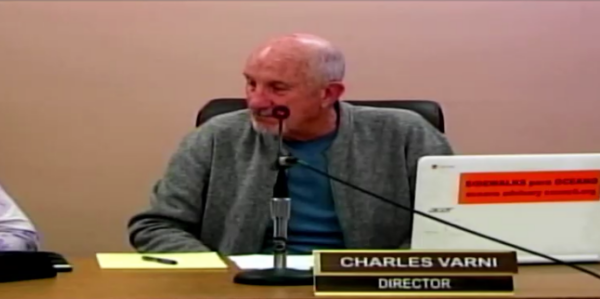Oceano officials need to stop the illegal behavior
December 22, 2023

OPINION by KIM ROSE and ALISHA CASSANDRA
We are Oceano residents and Oceano Community Services District ratepayers who filed the Brown Act complaint with the OCSD Board in November, following months of discord and chaos we observed at meetings. The discord was described as one of the most serious involving a public agency in recent county history.
The controversy ensued after the election of district board member Charles Varni in Nov. 2022 and blew up following the appointment of Board Member Beverly Suneson in March 2023, when a three-member Varni-led faction gained effective control of the OCSD Board.
We became alarmed at the Mr. Varni’s blatant violation of the Brown Act in meetings during Sept. and Oct. 2023, when he attacked the OCSD’s general manager and legal counsel for attempting to prevent his illegal public disclosures. Varni’s actions exposed the district to potential legal liabilities as well jeopardizing the status of its investigation of possible employee embezzlement, which could have alerted the unidentified target of the investigation.
These actions prompted public outcry and several chaotic public board meetings. Mr. Varni did not stop his illegal conduct at the OCSD board meetings. He continued to repeat his disclosures of confidential information in the print media and on the radio.
Filing of our Brown Act complaint
We decided to file our complaint to the OCSD Board to take corrective action as provided in the Brown Act and did so on Oct. 17. On Dec. 13, the OCSD board met in closed session to consider our complaint and its response.
Kim Rose addressed the board prior to its closed session and demanded the board be fully transparent about whatever actions it took, including the votes of each board member on those actions when it came out of closed session. Such disclosure is authorized by the Brown Act.
OCSD Board refuses to take corrective actions
The board came out of closed session, and its legal counsel announced that the board had declined on a 3-2 vote to correct its failure to authorize the pre-Oct. 17 disclosure of confidential information; and, on a 3-2 vote declined to refer our claim of Brown Act illegality to the SLO County District Attorney or Grand Jury.
Following disclosure of the Board’s refusal to act, Mr. Varni confirmed his previous denial that he had done anything wrong!
Member Varni participated and voted despite his legal conflict of interest
Without knowing which board members voted “yea” or “nay” on both complaints, the fact that no board member “recused” him- or herself from voting made clear that board member Varni violated state common law conflict of interest rules by participating and voting on both complaints, matters in which he was personally interested. In taking no action, the OCSD board itself violated the Brown Act again.
However, Mr. Varni’s actions in particular constitute official malfeasance, a quasi-criminal act, and we as complainants intend to file a complaint with SLO County District Attorney Dan Dow and the Grand Jury to consider appropriate investigation and prosecution of this misconduct. This complaint will be filed shortly after Jan. 1, 2024.
The OCSD Board’s and Mr. Varni’s unrepentant behavior
While the OCSD retained a new, interim general manager, Paavo Ogren, who has publicly stated his intention to restore civility and compliance with the law to the OCSD board, no “era of good feeling” has dawned. Indeed, the board on a 3-2 vote, Board members Varni, Suneson and Villa in support, elected the unrepentant Mr. Varni as the new board chair for 2024.
Why Mr. Varni’s actions flagrantly violated the Brown Act
Mr. Varni disclosed confidential information concerning OCSD actions involving the investigation of possible embezzlement of OCSD funds by a district employee, which he had no legal authorization to do so. Varni claimed to be a “whistleblower” against alleged “corrupt” and “cover up” actions.
His apparent objective in making these illegal public disclosures was to attack the OCSD General Manager Will Clemens and two fellow OCSD board members, whom he declared acted corruptly in connection with the investigation and pursuit of the alleged embezzler. His purpose — apparent from his actions and statements supporting his misconduct — was to get Clemens fired.
Whatever his objective or purpose, Mr. Varni’s disclosure violated a fundamental tenet of the Brown Act. The Brown Act carved out confidential closed session meetings as an exception to the Brown Act’s language and overarching purpose to promote public disclosure and public accountability of agency actions, to allow for discussion of details of sensitive employment, contract, and litigation matters. These exceptions were to accommodate important public disclosure while not unduly hampering an agency’s ability to make such decisions.
Under the Brown Act and the state’s “whistleblower” law, an agency official who claims such “whistleblower” status must first object privately to the conduct he or she wishes to have investigated; but if that objection is not taken up, the official must go to the District Attorney first; and finally, only after obtaining official authorization to disclose the information, is the public official authorized to publicly disclose the conduct.
The procedure is fundamental to protect due process rights of persons who may be accused publicly of unlawful conduct. Varni disregarded this important procedure. In fact, at the board’s Oct. 25 meeting, he acknowledged that what he was doing was illegal.
Here, both the alleged target of the embezzlement probe and the general manager and two OCSD board members accused of corruption and cover-up have due process rights that Mr. Varni bulldozed in his political efforts to fire the Manager and discredit the two board members.






The comments below represent the opinion of the writer and do not represent the views or policies of CalCoastNews.com. Please address the Policies, events and arguments, not the person. Constructive debate is good; mockery, taunting, and name calling is not. Comment Guidelines